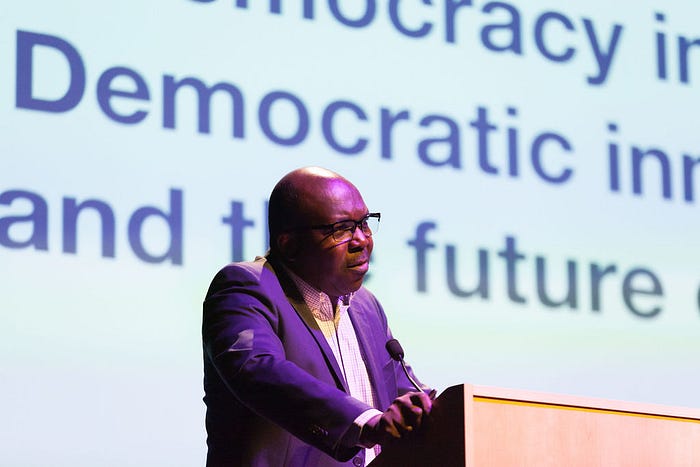Participedia receives $2.5 million to expand reach and impact
Participedia, a global resource for participatory democracy now based at McMaster University, has received a $2.5 million grant from the Social Sciences and Humanities Research Council (SSHRC) to expand its reach and impact.
Participedia was co-founded in 2009 by Archon Fung at Harvard University and Mark Warren at the University of British Columbia. The project is an international network of researchers, educators, practitioners, and policymakers who use an open-access crowdsourcing platform, similar to Wikipedia, to share research and information about democratic initiatives around the world.

Now housed within McMaster’s Centre for Human Rights and Restorative Justice and led by principal investigator Bonny Ibhawoh, this new phase of Participedia’s research brings together 63 researchers from 22 universities and 21 organizations across 12 countries — including five co-investigators at McMaster within the Faculty of Humanities and the Faculty of Social Sciences.
“Electoral democracy is under threat in many parts of the world — in both developing and developed countries — with crises such as the COVID-19 pandemic and climate change threatening to further destabilize people and political systems,” explains Ibhawoh. “At the same time, governments and organizations around the world have been organizing and responding to these threats. Through our global network of contributors, Participedia is documenting and mapping what exists and what is working.”
During Phase 1 of the project, which also received a $2.5 million grant from SSHRC, contributors compiled the largest database of its kind, with more than 1,800 cases and 330 methods of participatory democracy around the world on Participedia.net. These ranged from deliberative “mini-publics” (e.g. citizens’ assemblies) and popular assemblies (e.g. participatory budgeting), to protests, e-democracy, and land reform movements.
Working with funding from SSHRC and other sources, Phase 2 of Participedia will build on the work of the past six years. In addition to its initial focus on participatory governance, the project’s network will expand its focus to include five new areas:
- Human rights
- Democratic accountability
- Democratic representation
- Democracy across borders
- Democracy and digital communications
In particular, the next phase of work will focus on the challenges of democracy in the Global South, which refers broadly to the regions of Latin America, Asia, Africa and Oceania. Researchers and contributors will also address how non-Western democratic innovations are documented and analyzed by researchers.
“In many cases, people have been innovating for decades, but there are long standing inequities in how their work is understood by Western researchers” says Ibhawoh. “As well, we want to document civic engagement even in places that aren’t traditional democracies, like China — our primary interest is citizens and their investment in their government.”
Ibhawoh, who chairs the United Nations Expert Mechanism on the Right to Development, points out that while global political turmoil may make headlines, Participedia’s work shows that plenty is being done to counteract the spread of authoritarianism and populist nationalism — and provides resources for those who want to continue that work around the world.
“Ordinary people working at the grassroots are innovating and organizing out of the global spotlight,” he says. “Initiatives across the world that Participedia has highlighted, like participatory budgeting, citizen activism, and new ways of integrating Indigenous law and practices into the governance of settler-colonial states, show us that democracy is being defended in countless creative ways. It is up to us to make sure their efforts are shared as widely as possible.”

Partner organizations include McMaster University, Admiralty University of Nigeria, Brazilian Center of Analysis and Planning, Carleton University, Centre for Policy Research, Colorado State University, Deakin University, Emily Carr University of Art + Design, Ghana Institute for Management and Public Administration, Harvard University, Innovation for Policy Foundation, Potsdam Institute for Advanced Sustainability, Obafemi Awolowo University, Public Affairs Research Institute, Queen’s University, Ryerson University, Simon Fraser University, Social Equity and Participant Center, St. Francis Xavier University, Syracuse University, United Nations University, Universidade Federal de Minas Gerais, Universität Stuttgart, Université de Montréal, University of Alberta, University of Arkansas, University of British Columbia, University of Canberra, University of North Carolina at Asheville, University of Saskatchewan, University of Southampton, University of Sussex, University of the Western Cape, University of Toronto, University of Toronto-Scarborough, University of Westminster, Wilfrid Laurier University, and WZB Berlin Social Science Center.



